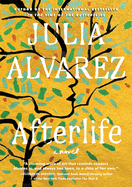
| Publisher: | Algonquin | |
| Genre: | Hispanic & Latino, Family Life, Literary, Marriage & Divorce, Fiction, Siblings | |
| ISBN: | 9781643750255 | |
| Pub Date: | April 2020 | |
| Price: | $25.95 |
| Starred | Fiction |
by Julia Alvarez
Julia Alvarez (In the Time of Butterflies; A Wedding in Haiti) wrings incredible emotion from her thoughtful novel Afterlife.
Set in present-day Vermont and around the East Coast and Midwest, the story follows retired college professor Antonia Vega through a time of grief and turmoil. Her husband, Sam, has just died, and while Antonia is adjusting to the "afterlife," her older sister, Izzy, disappears. Antonia and her other sisters believe Izzy has bipolar disorder, and hire a private investigator to help them find their missing sibling. While this is going on, Antonia's neighbor, Mario, an undocumented farm worker, solicits her help in getting his undocumented girlfriend, Estela, away from the coyotes who facilitated her illegal crossing into the U.S. Alvarez pulls all these threads together into a narrative that is in equal measure pensive and taut.
Much of Afterlife focuses on the fears and torments immigrants face daily. More than anything, though, it is a poignant meditation on death and the many ways humans deal with the absence of loved ones. Antonia is aging, and she wonders what legacy she'll leave behind, how she will persist, if at all, in the imaginations of others. Alvarez's deft prose turns beautifully evocative at just the right moments: "The evenings are long, the light lingering like a child fighting sleep to have one more bit of the day gone by."
Afterlife is a succinct and powerful novel about human connection. Alvarez is a writer in full command of her form, reminding the world of her vast and venerable talent. --Scott Neuffer, writer, poet, editor of trampset
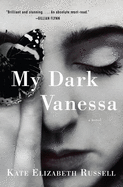
| Publisher: | Morrow | |
| Genre: | Psychological, Women, Literary, Fiction | |
| ISBN: | 9780062941503 | |
| Pub Date: | March 2020 | |
| Price: | $27.99 |
| Fiction |
by Kate Elizabeth Russell
With shocking precision, Kate Elizabeth Russell explores the blurred line between seduction and sexual predation, the complexity of victimhood and the meaning of control in her poignantly alarming debut.
Fifteen-year-old Vanessa is entranced when her 42-year-old English teacher, Jacob Strane, notices her. A loner who's afraid she's wasting her life, Vanessa absorbs his compliments about her hair and poetry. She devours the books he lends her, knowing they hint at his attraction. She seeks his advances, constantly saying what he wants to hear. But as the excitement of furtive half-kisses leads to Vanessa crying or lying cadaverous during sex, she doubts her control, realizing "the power to say no... isn't the same as being in charge."
Nearly two decades later, a journalist urges Vanessa to tell her truth amid sexual abuse allegations against Strane. She loathes the idea of turning what she wants to remember as a consensual romance into something ugly. Because if she decides she never wanted him, what would that mean he's done to her?
Russell deftly portrays the sinister subtlety of sexual predation. Even at 32, Vanessa insists she wasn't abused, unable to see that wielding her body's allure didn't negate Strane's manipulative psychological grooming. Her experience depicts the helplessness cultivated when violence against women is so prevalent, they "grow up wondering when it's finally going to happen." My Dark Vanessa is a necessary debut to outrage readers over the horrifying ways society normalizes, excuses and trivializes sexual abuse. --Samantha Zaboski, freelance editor and reviewer
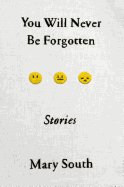
| Publisher: | Farrar, Straus and Giroux | |
| Genre: | Short Stories (single author), Literary, Fiction | |
| ISBN: | 9780374538361 | |
| Pub Date: | March 2020 | |
| Price: | $15 |
| Fiction |
by Mary South
Mary South's sharp debut story collection, You Will Never Be Forgotten, explores the often harsh and always heartbreaking contemporary world through 10 stories of everyday people coping with loss, violence and grief. In "The Age of Love," a male rest home nurse struggles to hold on to his girlfriend after an elderly patient begins wooing her. Meanwhile, in "To Save the Universe, We Must Also Save Ourselves," a fan community watches the continual build up and break down of the real people behind their favorite characters. Finally, in the collection's title story, a young woman cyber-stalks her rapist's girlfriend. A mix of surrealism, science fiction, realism and magical realism, these stories remain grounded in human experience regardless of their genre-blurring tendencies.
You Will Never Be Forgotten holds firmly together as an exploration of a modern moment defined by cutting-edge science and technology but nevertheless essentially comprised of human emotion. The writing, like the worlds in which South's characters live, is cool, hard-edged and sterile, but full of feeling. Often, South's characters push against the boundaries of social media or attempt to confine themselves within institutions, only to find themselves still in the endless space of longing and despair in which they originated. It is through this juxtaposition of the human and nonhuman that South most effectively throws the intensity and reality of her subjects into relief. Like the narrator of "Frequently Asked Questions about Your Craniotomy," South delivers these poignant, darkly funny tales with a clinical precision that reveals, rather than obscures, her constant reminder that we are all still, despite everything, alive. --Alice Martin, freelance writer and editor
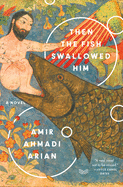
| Publisher: | HarperVia | |
| Genre: | Psychological, Literary, Political, Fiction | |
| ISBN: | 9780062946294 | |
| Pub Date: | March 2020 | |
| Price: | $25.99 |
| Fiction |
by Amir Ahmadi Arian
Prolifically published in his native Farsi, Amir Ahmadi Arian makes his English-language debut with Then the Fish Swallowed Him, a disturbingly irresistible novel exposing the invalidity of truth and lies under a despotic regime. Growing up in a volatile, politically fractured society and losing both parents as a teenager, Yunus Turabi eschews affiliations, groups, even personal relationships. He's spent his adult life as a Tehran bus driver, allowing him a solitary existence surrounded by strangers. His inadvertent involvement with the bus drivers' strike has him scrambling to the relative safety of a bus rooftop, from which he reluctantly bears witness to the vicious pandemonium. When he returns to his route three days later, violence looms, and he ferociously attacks a young agitator just 10 minutes before his final stop. He's immediately arrested, blindfolded, hands zip-tied and then transferred from the police station to Evin, a notorious bastion of torture and disappearance. His one constant contact is Hajj Saeed, a man capable of savagery who can be overheard lovingly speaking to his wife and son. Reality turns surreal as truth becomes impossibly irrelevant amidst the need to survive.
In seeking his own safety, Arian left Iran in 2011 to earn a comparative literature Ph.D. in Australia. He arrived in the U.S. in 2016 to complete an MFA at New York University and now teaches creative writing at CUNY. Raised in a country devastated by the Iran-Iraq War, Arian lives with PTSD: "Between silence and speech lies the act of writing," he reveals in an essay previously published in Guernica: "This is where I seek my remedy." His fiction proves to be his best antidote. --Terry Hong, Smithsonian BookDragon
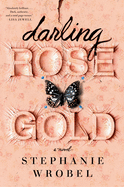
| Publisher: | Berkley | |
| Genre: | Psychological, Women, Literary, Thrillers, Fiction | |
| ISBN: | 9780593100066 | |
| Pub Date: | March 2020 | |
| Price: | $26 |
| Mystery & Thriller |
by Stephanie Wrobel
Stephanie Wrobel's twisted Darling Rose Gold begins with the titular character picking up her mother, Patty, from prison. Patty has completed her five-year sentence for aggravated child abuse--making her daughter and everyone else believe Rose Gold was chronically ill when nothing was wrong with her.
Until Patty finds a job and place of her own, she asks to stay with Rose Gold, who consents under the condition the situation is temporary. Patty secretly vows, however, to reinstate her control over Rose Gold and never be separated from her precious daughter again. But Rose Gold isn't the easily manipulated girl she used to be. She's a young woman now caring for her own baby, Adam.
Patty also discovers the entire town has turned against her; she's excoriated everywhere she goes. Which makes her wonder: Will her former friends and neighbors sympathize with her again if her grandson suddenly gets sick?
Wrobel employs dual points of view to crack open Rose Gold's and Patty's essences. Both are scheming and often unpleasant, but Wrobel delves deeply into their psyches to illuminate the pain and past damage that motivate the women to commit disturbing actions. Rose Gold is done with being victimized, and simply wants everyone who's hurt her to get a taste of their own medicine. Patty refuses to admit she ever did anything wrong with Rose Gold, and Wrobel makes this understandable--sometimes one must deny reality in order to survive. The women's lonely, desperate inner lives elicit both empathy and alarm, and readers' loyalties will flip-flop from chapter to chapter in this unsettling yet engrossing debut. --Elyse Dinh-McCrillis, blogger at Pop Culture Nerd
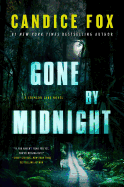
| Publisher: | Forge | |
| Genre: | Private Investigators, Mystery & Detective, Crime, International Crime & Mystery, Thrillers, Fiction | |
| ISBN: | 9781250317582 | |
| Pub Date: | March 2020 | |
| Price: | $27.99 |
| Mystery & Thriller |
by Candice Fox
Candice Fox's Gone by Midnight (part of the Crimson Lake series) is a dark thriller about a boy who goes missing and the race to find him alive.
Richie Farrow is a preteen on vacation having a sleepover with three other kids. The parents are all in the hotel restaurant having drinks while the kids watch movies in one of the family's rooms. Then Richie goes missing, but none of his pals know what happened to him, claiming he just disappeared.
The local police rush to find Richie. But Richie's mother has been accused of mistreating her children in the past and fears her record will make her a suspect. She hires Ted Conkaffey, a former cop who had to resign from the force amid suspicions he's a pedophile. Ted was cleared of all charges, but public and police opinion says otherwise. And hiring Ted means hiring his partner, Amanda Pharrell, a convicted killer. The police hate Amanda and become more focused on stopping her and Ted from finding Richie than working together to find the boy.
Gone by Midnight's central mystery is propelled by the solid character development of just-trying-to-put-his-life-back-together Ted and scrappy, mouthy and smarter-than-everyone-else Amanda. Their relationship is never easy, but always electric as they struggle with personal problems while on the trail of a stone cold, unexpected villain. The story veers slightly off course in having the police ignore all the evidence clearing Ted and portraying them as simpleton bullies motivated solely by innuendo. Luckily, the misstep doesn't derail the jaw-dropping reveal of what happened to Richie. --Paul Dinh-McCrillis, freelance reviewer
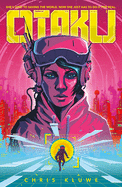
| Publisher: | Tor | |
| Genre: | Fantasy, Contemporary, Fiction, Action & Adventure, Science Fiction | |
| ISBN: | 9781250203939 | |
| Pub Date: | March 2020 | |
| Price: | $26.99 |
| Science Fiction & Fantasy |
by Chris Kluwe
"In the Game, you learn quick or you die." Author and former NFL player Chris Kluwe's (Beautifully Unique Sparkleponies) first novel will grip readers with its riveting pace, fierce heroine and intense focus on combating social injustices. For Ashley Akachi--aka Infinite Game legend Ashura the Terrible--the Game is more than just sport: it's the freedom to be herself, an impossibility in the "Real" of the post-Water Wars theocracy where she lives. With the support of her SunJewel Warriors teammates, Ash has learned to navigate the vitriol of ultra-misogynistic trolls and to thrive in the VR encounters that call to "something inside [her], a thrill [she] can't find anywhere else."
When Ash stumbles on a plot to turn Gamers into unwitting mercenaries with technology "designed to infiltrate people's minds," she is horrified at the manipulation: "We've trained ourselves into a goddamned army." With the possibility of another world war looming, Ash and her teammates are conscripted by the military in order to uncover the foreign threat, and their game-honed skills are all that stand in the way of global collapse.
Trapped in a reality where the theocratic government subjugates women and minorities, Infinite Game offers a haven to many like Ash, "where you can make mistakes, learn who you are and what you believe, what you're willing to fight for." But Ash is a fighter in reality, too, and rooting for her in both the Game and the Real is an exciting (and often bloody) adventure. Regular nods to classic science fiction and fantasy alongside conversations about racism, toxic masculinity, religious persecution and socio-economic injustices make Otaku a great choice for fans of fun and insightful science fiction. --Jennifer Oleinik, freelance writer and editor
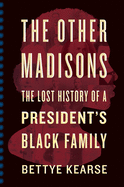
| Publisher: | Houghton Mifflin | |
| Genre: | Biography & Autobiography, United States, 19th Century, Personal Memoirs, History, African American | |
| ISBN: | 9781328604392 | |
| Pub Date: | March 2020 | |
| Price: | $28 |
| Biography & Memoir |
by Bettye Kearse
Bettye Kearse grew up hearing a line of advice that had been handed down in her family through generations: "Always remember--you're a Madison. You come from African slaves and a president." In The Other Madisons: The Lost History of a President's Black Family, she works to explore this statement and its implications for her life.
West African griots (masculine) and griottes (feminine) have, for many centuries, been caretakers of the oral traditions of their families and communities. Bettye's mother was the seventh griotte in her family, tracing back to a girl who was kidnapped from what is now Ghana and renamed Mandy on the shore of Virginia, where she would be treated as a possession of James Madison, Sr., and bear him a daughter. As this book opens, Bettye's mother delivers to her the box of records and memorabilia that generations of "Other Madisons" have compiled. This spurs the author on her own path to become a griotte, to retell the story of her family.
Kearse's research, and that of the griots who came before her, is impressive. Seeking deep truths, she travels from her home in Boston to Ghana, Nigeria, Portugal, New York City and Madison's plantation in Virginia, walking in her ancestors' footprints and grasping ever more deeply the magnitude of the tragedy of slavery. The Other Madisons, as a thorough history of one family, may offer answers for other descendants of enslaved people as well. It is part personal quest, as Kearse works to understand and reconcile her own origins, and a carefully researched and documented correction to the American historical record. --Julia Kastner, librarian and blogger at pagesofjulia
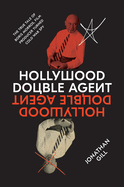
| Publisher: | Abrams | |
| Genre: | True Crime, United States, Espionage, Intelligence & Espionage, 20th Century, History, Political Science | |
| ISBN: | 9781419740091 | |
| Pub Date: | April 2020 | |
| Price: | $27 |
| Starred | Social Science |
by Jonathan Gill
Soviet spies! G-men! Blackmail! Assassins! Silly code names! This sounds like a movie, but they can all be found in Hollywood Double Agent: The True Tale of Boris Morros, Film Producer Turned Cold War Spy, a biography of perhaps the world's most improbable secret agent.
It wasn't just that Morros was short, bald, rotund, poorly dressed and otherwise superficially the anti-James Bond; he was also, writes Jonathan Gill (Harlem), "ideologically uncommitted, constitutionally indiscreet, addicted to fame and money, and oblivious to the distinction between truth and fiction." When researching Hollywood Double Agent, Gill couldn't rely on Morros's 1959 autobiography, My Ten Years as a Counterspy--even Morros's widow called it fiction. Instead, Gill turned to previously classified documents from the FBI and the KGB, and the result is a gob-smackingly good read.
A piano prodigy in 1891 in Russia, Morros made a name for himself in the music biz working for Paramount Pictures in 1920s Manhattan. By 1934, Morros was one of the pillars of the Paramount operation, and Soviet agents appealed to him to help create an anti-fascist underground in Germany in exchange for cash. He worked this second job even after he moved to the West Coast to head Paramount's music department. Morros was realizing his dream of becoming a big-shot movie producer--until the demands of his sideline started to take over his life.
Readers of Hollywood Double Agent may come for the glitter, but they'll stay for the intrigue. Although Gill's book reads like a Cold War thriller, at heart it's the amazing true story of an American dream gone wrong. --Nell Beram, author and freelance writer
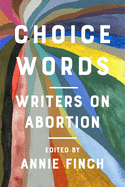
| Publisher: | Haymarket Books | |
| Genre: | Feminism & Feminist Theory, Women Authors, Abortion & Birth Control, Literary Collections, Social Science | |
| ISBN: | 9781642591484 | |
| Pub Date: | April 2020 | |
| Price: | $28.95 |
| Social Science |
by Annie Finch, editor
"A physical, psychological, moral, spiritual, political, and cultural reality that navigates questions of life and death, abortion should be one of the great themes of literature," editor Annie Finch writes in her introduction to Choice Words: Writers on Abortion. All politics aside, it's a fair point. Having found no major literary anthology on the subject of abortion, Finch took it upon herself to create such a book, and the result, two decades in the works, is a hefty collection of generally high quality.
Contributors to Choice Words are both emerging writers and canonized authors (Gwendolyn Brooks, Langston Hughes, Dorothy Parker, Anne Sexton). Pieces date back as far as the 16th century; storytelling voices belong to those as young as high school age. The book's 140 contributions, fairly evenly split between poetry and prose (fiction, essays, performance pieces, tweets), are bundled into five sections--Mind, Body, Heart, Will and Spirit--although most offerings would fit in multiple categories. The anthology's contents are confessional, funny, graphic, stolid, absurdist, cagey, heartbreaking, vitriolic and on it goes, the approaches to the subject at hand as varied as human experience.
While Finch makes plain in her introduction that she and her contributors support reproductive rights, Choice Words includes work by several women who harbor some regret about having had an abortion. "The possibility of negative feelings is part of the responsibility of choice," writes Finch, with a nod to contributor Caitlin McDonnell. In McDonnell's words, "It's a grief I live with. It's my grief. I wouldn't have it any other way." --Nell Beram, author and freelance writer
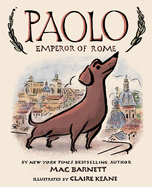
| Publisher: | Abrams | |
| Genre: | People & Places, Humorous Stories, Animals, Europe, Dogs, Juvenile Fiction | |
| ISBN: | 9781419741098 | |
| Pub Date: | March 2020 | |
| Price: | $17.99 |
| Starred | Children's & Young Adult |
by Mac Barnett, illust. by Claire Keane
Paolo, a little dog with big dreams, longs to experience the freedom just beyond his front door in this charming picture book from the prolific Mac Barnett (Just Because; The Wolf, the Duck, and the Mouse) and Claire Keane (Once Upon a Cloud, Little Big Girl).
Trapped in the salon where he lives, Paolo could "poke his nose outside and, sniffing, smell all the smells of Rome--salty, sour, meaty, flowery. That was all Paolo got of liberty: a whiff." One day, when the door is left ajar, Paolo escapes: "And was the city all he imagined? It was more." He experiences the historic grandeur of the Colosseum, fights off cats in ancient ruins, dines on the finest restaurant garbage and leads a pack of stray dogs on adventures. When Paolo witnesses nuns falling into the Trevi Fountain, he leaps to the rescue and is honored for his valor with special rooms in the papal apartments. But Paolo leaves even these beautiful furnishings behind, "for walls are walls, even when papered in gold." The city--and his own sense of independence--call to him. "And Paolo's proud spirit was boundless. He could not be contained."
Barnett's text impressively balances the humor of a little dog ruling over such a grand city with the sweet innocence of Paolo as he experiences the joy found in table scraps and papal apartments. Former Disney Animation artist Claire Keane's thick, black lines are softened by lovely pastels and earth tones, the illustrative style mirroring Paolo's own delightful boldness. Both Keane's art and Barnett's plucky hero give the big city of Rome an exciting and inviting feel, making it a delightful adventure for readers and travelers of all ages. --Jennifer Oleinik, freelance writer and editor
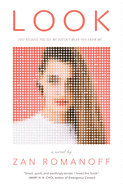
| Publisher: | Dial Books | |
| Genre: | Friendship, Romance, Girls & Women, Social Themes, Young Adult Fiction, LGBT | |
| ISBN: | 9780525554264 | |
| Pub Date: | March 2020 | |
| Price: | $17.99 |
| Children's & Young Adult |
by Zan Romanoff
This character-driven YA novel about the harmful effects of social media features a young woman learning about sexuality and empowerment.
Seventeen-year-old Lulu has curated the perfect life for her 10,000 Flash followers to admire. Her first real post, though, is an accident: Lulu sends her followers a video of her kissing a girl. When Lulu meets Cass, who doesn't care about following social rules, it's as if "the unapologetic, unadorned voice" in the back of Lulu's head has come to life. Cass takes Lulu to The Hotel, an old Hollywood building and no-phone-zone being restored to its former glory by Cass's 18-year-old mega-wealthy best friend, Ryan. There, without the public's watchful eye, Lulu feels safe to explore feelings she doesn't quite know how to name. But Lulu soon finds herself in the limelight again when Ryan's possessiveness over Cass reveals itself in a very public way.
Look is a love letter to the Selfie Generation. Zan Romanoff (Grace and the Fever) cautions against the dangers of keeping up appearances, confirms it's sometimes okay not to be okay, and encourages teens to be themselves: "Isn't it a type of normal? If it's what's normal for me?" Lulu's self-discovery teems with feminist themes. Whether it's Lulu coming to terms with what feminism means to her or a podcast examining the ways men use women's beauty to control them, Romanoff bolsters Lulu's journey to validation with much-appreciated feminist critique. Look and Lulu feel like a plea from Romanoff: stop showing the world what you think others want to see and instead show them what you are. --Lana Barnes, freelance reviewer and proofreader
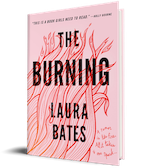
| Publisher: | Sourcebooks Fire | |
| Genre: | Bullying, Pregnancy, Emotions & Feelings, Social Themes, Girls & Women, Young Adult Fiction, Self-Esteem & Self-Reliance | |
| ISBN: | 9781728206738 | |
| Pub Date: | April 2020 | |
| Price: | $17.99 |
| Children's & Young Adult |
by Laura Bates
Feminist activist Laura Bates is no stranger to the stories of girls and women who experience gender inequality and cruelty. As founder of the Everyday Sexism Project and author of several nonfiction books (Everyday Sexism; Girl Up; Misogynation), she is helping make a cultural shift away from the centuries-old tolerance for sexist attitudes and behaviors. The Burning, her debut work of young adult fiction, could just as easily be nonfiction. Deeply researched and drawing on the countless experiences of girls and women around the world, the novel pulls no punches.
Anna Clark is looking for a fresh start. After a calamitous year in which her father died of cancer and her boyfriend shared nude pictures of her on social media--which led to a bullying campaign--she and her mother moved from Birmingham, England, to a small village in Scotland. Their hope was that they would leave everything behind, especially Anna's unwarranted reputation as a "slut." Unfortunately, the Internet has a way of catching up with a person and soon enough, Anna's fledgling new life as a regular 15-year-old girl is thrown into chaos. This time, however, investigating a centuries-old tragedy for a school history report helps keep her from being completely engulfed in her retraumatization.
While researching, Anna comes across a footnote in a book that refers to a mid-1600s witchcraft trial in her village. Intrigued, Anna digs deeper, discovering fragments of information about Maggie Morgan, a 17-year-old girl from a fishing family, who had the misfortune to catch the attention of a local nobleman. Unaccustomed to having his advances spurned, especially by girls of lower social status, he pursued her even when she said no. He raped her and, when she could no longer hide the resulting pregnancy, she was punished and humiliated by the village ruling council and citizens, who knew better than to accept her claim that the baron's son was the father. When the nobleman was lost at sea after the baby was born, the villagers accused Maggie of witchcraft.
Anna relates all too well to Maggie's wrongful punishment and humiliation. Her hands are full and her heart is breaking as she deals with her new classmates' cruel verbal and digital abuse; though Anna is growing accustomed to having friends abandon her, it still hurts. As she pieces together the story of the long-ago travesty, she begins having strange, lucid dreams, as if she herself were Maggie. Anna becomes obsessed with these visions, eager to learn more of Maggie's story: "At night I hurtle through the terrifying ordeal of Maggie's world. By day, I hurtle through a terrifying ordeal of my own."
Though her local research source minimizes Maggie's punishment and murder by saying "these were different times," Anna knows better than most just how untrue this statement is. The lives of Anna and Maggie, four centuries apart, come into parallel formation. Each is shamed and silenced not by what she herself did, but by something a boy has done to her. Each grows isolated as friends distance themselves. And, despairing, each descends into self-hatred and guilt. Anna: "Nobody wants to be associated with a slut." Maggie: "If only your neighbors knew their taunts pale into insignificance beside the harshness of the words you hurl at yourself."
Although The Burning is packed with the kind of ideas and situations that could populate a dissertation, it reads as a painfully realistic, spellbinding novel. For example, soon after her new classmates discover her past, Anna stumbles upon a "fierce knot of gossip" outside her classroom: "Just as well [her dad] doesn't have to die of embarrassment at his daughter tramping around all over the internet." Anna's emotions churn. "I feel something inside me snap. Fury fills me like rocket fuel, propelling me forward, out of my hiding place, ready to... I don't know what... ready to explode, or hit them, or scream that it wasn't like that, that I didn't do it for attention, that I never wanted any of this." Like real people living in a complex world, the characters live in shades of gray, feeling guilt and shame right alongside their outrage and self-righteousness.
Readers will be drawn in from page one of Laura Bates's well-paced novel, riveted by the side-by-side stories of wronged girls living centuries apart. Bates plants readers squarely in the minds and hearts of two girls who, like so many, swiftly and all too easily find themselves on the wrong side of justice. Woven into Anna's first-person narrative are second-person flashbacks to Maggie's lifetime, evoking the infuriating side-by-side impotence of being trapped in a culture of gender inequity. Readers will cheer when someone finally does speak up on behalf of girls, and maybe even pick up a pointer or two on how to fight back against sexism. --Emilie Coulter